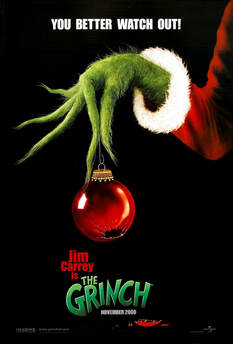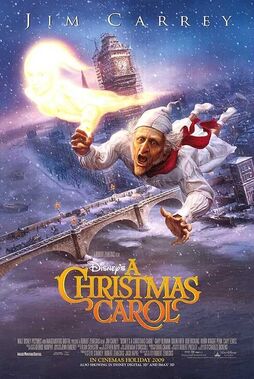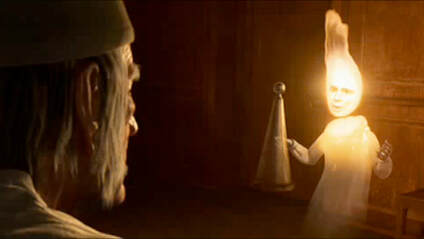
https://christiananswers.net/spotlight/movies/2000/howthegrinchstolechristmas.html
The Grinch (Jim Carrey): “Max! Help me! I'm feeling!”
In my household, I make no apology for the fact that I prefer my Christmas films to be a little darker in tone, and anarchic in nature. For example, I adore the mean-spirited mania of Joe Dante’s Gremlins – a welcome antidote to the saccharine festive offerings we’ve come to expect from Hollywood. But each year, my family will only humour me for so long, as they often need A Charlie Brown Christmas to come along and lift our spirits too (it is the season of hope and goodwill, after all). On all of our Christmas film nights, however, I try to meet them in the middle when we’re selecting a festive film to watch. And Ron Howard’s How the Grinch Stole Christmas is that middle ground, striking an almost perfect balance between simultaneously revelling in gleeful hatred for the season, and falling head over heels in love with its message too. But more importantly, seeing as Jesus is the reason for the season, is it one of those mainstream films which covertly features Christian themes within? Not exactly…
The inimitable Jim Carrey stars as the Grinch, a cantankerous, reclusive creature who lives on Mount Crumpit with Max, a canine, and his only companion. His cave looms large over Whoville, a place of joy for many, but only despair for the Grinch. For he is an orphan, but also a peculiar looking individual, which made him the source of much ridicule for the people of Whoville throughout his childhood. Ostracised from the townspeople, the Grinch decided to place himself in a self-imposed exile, thinking he will be better off alone. But when Christmas comes around however, the Grinch simply cannot stand the merrymaking – the townspeople’s singing reaches him even all the way up at Mount Crumpit! Enraged, the Grinch concocts a plan to crush the Whos Christmas spirit, by stealing all of their presents, decorations and food while they're sleeping. But a chance meeting with the innocent, idealistic Cindy Lou Who, leads the Grinch to wonder whether his cold, ‘two sizes too small’ heart, might become a warmer, larger one instead…
One could say that the Grinch suffers from an orphan heart, and that all he needs to be made whole is find loving acceptance from people and realise that the reason for the season is showing goodwill towards others, sharing and being part of a community – even an imperfect one such as his. But the Bible teaches that the Grinch’s issues cannot be solved by the world around him. In fact, no amount of human care and attention, or sheer determination to change one’s ways will solve the issues within the Grinch’s heart. No, the Grinch’s issues stem from the condition of his heart – not in the physical sense, but he has a spiritual issue that no amount of festive cheer or acceptance from others, will fix.
It’s within our innermost being that our emotions and desires dwell – otherwise known as our heart. But God teaches in his word, the Bible, that our hearts are faulty. For internally, we are filled with darkness: “The human heart is the most deceitful of all things, and desperately wicked. Who really knows how bad it is?” (Jeremiah 17:9, NLT). Since the day humankind first decided to do wrong in Gods eyes (thereby sinning against Him), the darkness which comes about because of sin has entered into our world like a sickness, poisoning everything that was once good – including the human race. It means that our lives have been corrupted by sin – even our emotions and desires. Jesus knew this, and specifically spoke on the state of our hearts: For from within, out of a person’s heart, come evil thoughts, sexual immorality, theft, murder, adultery, greed, wickedness, deceit, lustful desires, envy, slander, pride, and foolishness. All these vile things come from within; they are what defile you.” (Mark 7:21-23, NLT). And so, it is the same with the Grinch – for his evil actions and hatred comes from within, and so too does his longing for connection and love. But when we do wrong in the eyes of our creator, sin and darkness breaks apart the connection we’re intended to have with him. The Grinch is not only an orphan in the worldly sense, but the spiritual also. And we are also cut off from God.
However, the film (and original book) doesn’t reach this epiphany. Rather, upon hearing the Whos rejoicing in song with one another, despite them having had their Christmas literally snatched away from them, the Grinch comes to understand that “Christmas doesn’t come from a store”, and “perhaps…means a little bit more”. It’s then that the Grinch’s heart begins to grow, and he determines to become a new man. And so, the film’s meaning of Christmas is revealed: We save ourselves and one another, from our cantankerous, evil ways, teaching one another and learning to prioritise loving each other, instead of being preoccupied by materialism. But the Grinch hasn’t at all dealt with the root of his anger, hatred and pain. He has simply self-medicated, through responding to the Whos appeal to embrace the better side of our human condition. But as we have read, however, that isn’t always possible – darkness still stems from our very hearts and affects the way in which we live our lives.
No, the Grinch’s only hope for true, lasting change (and ours too), is by seeking a transplant of the heart – rejecting the evil within, and embracing the cleansing power of God instead, which alone makes us righteous people and deals with even the darkest area of our hearts. And we do this by coming before Jesus and prayerfully asking for His forgiveness, which was made available to all, because of what He did for us on the Cross, 2,000 years ago. For “everyone has sinned” and fallen “short of God’s glorious standard” (Romans 3:23, NLT) due to the way in which we have lived our lives. And as a result, we need fixing. For if we don’t receive that heart transplant, we will only be caught in sin’s binding grip, eventually receiving “the wages of sin (which) is death” (Romans 6:23, NLT) for all of eternity – separation from God as punishment for our sins.
But God, through the work of His Son Jesus Christ, offers a once-and-for-all heart transplant today. For if we acknowledge our wrongdoing and turn from it, we can be forgiven and enter into an eternal friendship with God. And this was made possible by God when He sent His Son to pay the price which we owed to Him, in giving His life for us on the Cross, where He was brutally crucified as the “…offering for our sin”, so “that we could be made right with God through Christ” (2 Corinthians 5:21, NLT), and avoid eternal death. And so, if we ask for His forgiveness and choose to obediently follow God for the remainder of our days here on Earth, He promises He will: “give you a new heart” and “put a new spirit in you”, removing a “stony, stubborn heart” to “give you a tender, responsive heart” instead (Ezekiel 36:26, NLT). It’s an offer that is available to all today (even the grinchiest among us), enabling those who respond, to live in freedom from the weight of sin, with everlasting joy, hope, love and peace – not just that which we find at Christmas time.
Challenge:
Why not prayerfully invite a friend or family member who doesn’t yet know Jesus, to watch How the Grinch Stole Christmas? Use the film’s themes to ask them what they thought of the film, if they spotted any links to Christianity and what they might think of the Gospel’s response to this subject.
If you feel able to, ask them what they think about the film’s understanding of what it means to have a heart – is that where our sense of goodness comes from? Can it be ‘enlarged’, just as the Grinch’s was, filled with goodness? Ask them what they think is the reason for the darkness which overflows within the Grinch’s heart. Is anyone truly to blame for the way he acts, or is he alone responsible for the way in which he reacts to the situations he is faced with?
Prompt them to consider the state of the Grinch’s heart – do they think it’s possible that a heart be can be changed with the ease shown in the film? Go on to discuss the lifesaving, life-changing gift of salvation, saying that God, through the sacrifice of Jesus, showed His love for us, to make a way so that nobody would have to live apart from Him in hell, for eternity. Instead, God is in the business of making hearts clean, so we might enter into relationship and eternity with Him. Take the opportunity to share the hope of the Gospel message with them – noting that God is the One alone who cleans us up and saves us from the grip of darkness now, but also in eternity too. Then, invite them (if you feel prompted to by God) to consider accepting Jesus into their life today.
Prior to watching the film for yourself, however, take a moment to pray that God would speak to you through the film. If you feel comfortable, pray this prayer over all of your future, film-watching experiences:
Dear Lord, as I watch this film, I ask that you would be present here with me. Highlight to me anything within it that is honourable, anything that can be used in conversation for your Kingdom purposes. Amen.
How the Grinch Stole Christmas is now available to rent through YouTube and Amazon Prime Video.






 RSS Feed
RSS Feed